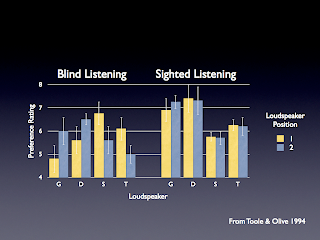One reason that we are always struggling with this topic - How the Ear Works - is that the ear is intimately intertwined with the brain. We already know that the ear is an active instrument - and hence it does not work without the input and feedback (and also feed-forward) from the brain.
Gary,
Maybe this is why the high-end is so subjective. Some people have excellent hearing, shown by frequency measurement tests, but their perception of sound in a noisy background or simply with a mixed conversation is not good. But the opposite also happens - some people with bad hearing are excellent listeners. Hearing and listening are different things.
IMHO, the hearing of high-end consumers is progressively educated. I am sure my hearing is not as good as thirty years ago, but my discrimination abilities improved a lot. The best training come from life auditions, but they also brought the more biased approaches. I praise some aspects that I associate with a life event of classic music or jazz, and I am perhaps less sensitive to others that heavy rock listeners consider of great importance.
Can anyone build a model of how this happens in terms of how the ear works?







